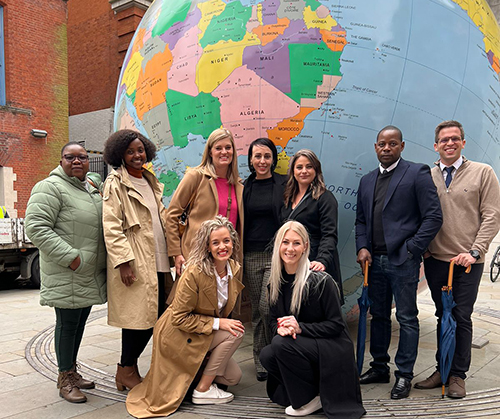North-West University Researchers Work to Bridge Continents Through Collaborative Projects
In their pursuit of driving innovation and expanding the North-West University’s (NWU’s) global research, a delegation of nine researchers recently embarked on a fruitful international visit to the United Kingdom (UK).
The researchers visited two prestigious institutions, the London School of Economics and Political Sciences (LSE) and the University of Lincoln, and were cordially received by their UK counterparts.
The primary goal of the visit was to foster international collaboration and potential partnerships aimed at research, teaching and programme development, with special emphasis on the Africa Trade Platforms project.
The NWU’s researchers included Prof Steve Dunga, Prof Zandri Dickason-Koekemoer, Prof Suné Ferreira-Schenk, Prof Ireen Choga, Ermie Steenkamp, Prof Carli Bezuidenhout, Dr Jabulile Makhalima, Dr Jacques de Jongh, and Dr Lorainne Ferreira.
They are affiliated with the research focus area Trade, which specialises in the fields of development economics, international trade, supply chain management and transport, applied economics and econometrics, and financial markets.
Laying the groundwork with the LSE
During their visit to the LSE, the researchers engaged in a series of meetings with notable individuals including Prof Tim Allen, director of the Firoz Laljii Institute for Africa. Other notable individuals from the Firoz Lalji Institute included Fadil Elobeid, Africa engagement project manager, Dr Martha Geiger Mwenitete, chair of strategic development and institute manager, Dr Marta Soprana; research fellow in the Department of International Relations, and Richard Alexander from the School of Oriental and African Studies.
The delegation also met with Prof Abigail McKnight, director of the Centre for Analysis of Social Exclusion (CASE), and Dr Kitty Stewart, associate director of the CASE, respectively.
The meetings resulted in potential joint research initiatives and the sharing of data and resources with Prof David Luke, strategic director at the Firoz Lalji Institute. Prof Luke is set to be appointed as an extraordinary research professor at the NWU and this will complement the ongoing collaboration on research articles meant for publication.
Dr de Jongh highlighted the NWU’s capabilities and encouraged research discussion during his lecture titled “Global forces and local realities: Economic development in South African Customs Union (SACU) amidst ‘slobalisation’”.
The meeting with Prof McKnight and Prof Stewart from the CASE was also fruitful, with common interests in poverty research being identified and workshops being planned to align research interests and future projects.
Dr Alexander and Dr Soprana showed interest in serving as external examiners for examining postgraduate NWU dissertations in their fields of study. Dr Soprana also agreed to provide a guest lecture in applied international macro-economics .
Paving the way with the UL
The NWU delegation’s visit to the University of Lincoln (UL) aimed to build on a signed memorandum of understanding between the institutions to formalise various areas of collaboration. Prof Dunga, Prof Choga and Dr De Jongh were met by the economics team at the UL, led by Prof David Gray, economic programme development manager. They exchanged ideas for joint research projects – particularly in development economics – and the potential co-hosting of the fLincoln Conference on Development Economics in South Africa.
Opportunities for staff exchanges, guest lectures and team teaching were explored, following a recent guest lecture by the UL’s Dr Abbas Ali Gilani for NWU honours students in econometrics.
The delegation further reviewed programmes from both universities to assess the feasibility of joint offerings and expressed interest in joint supervision of postgraduate students. Colleagues from both institutions committed to participating in weekly seminars where research ideas and current research projects will be shared to further promote collaboration.
Overall, the visit to the UK was prosperous, creating the foundation for robust international partnerships and collaborative research projects.

